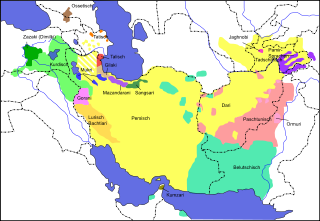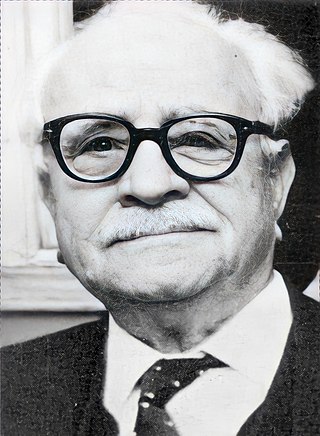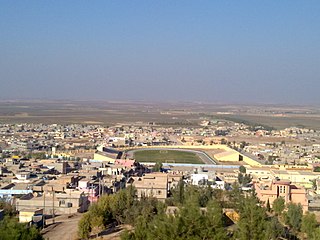Michael L. Chyet (born 1957) is an American linguist.
He is a cataloguer of Middle Eastern languages at the Library of Congress. Formerly he was senior editor of the Kurdish Service of the Voice of America and professor of Kurdish at the University of Paris and at the Washington Kurdish Institute.
He has written a Kurdish-English dictionary. He is a skillful linguist who is fluent in several Middle Eastern languages, including Arabic, Hebrew, Persian, Turkish and at least two dialects of Kurdish, both Sorani and Kurmanji, in addition to several other European languages.
W, or w, is the twenty-third and fourth-to-last letter of the Latin alphabet, used in the modern English alphabet, the alphabets of other western European languages and others worldwide. It represents a consonant, but in some languages it represents a vowel. Its name in English is double-u, plural double-ues.

Kurdish is a language or a group of languages spoken by Kurds in the geo-cultural region of Kurdistan and the Kurdish diaspora. Kurdish languages constitutes a dialect continuum, many of which are not mutually intelligible, belonging to Western Iranian languages in the Indo-European language family. The main three dialects or languages of Kurdish are Northern Kurdish, Central Kurdish, and Southern Kurdish.
Phonetic transcription is the visual representation of speech sounds by means of symbols. The most common type of phonetic transcription uses a phonetic alphabet, such as the International Phonetic Alphabet.

Turkology is a complex of humanities sciences studying languages, history, literature, folklore, culture, and ethnology of people speaking Turkic languages and Turkic peoples in chronological and comparative context. This includes ethnic groups from the Sakha in East Siberia to the Turks in the Balkans and the Gagauz in Moldova.

Zaza or Zazaki is a Northwestern Iranian language spoken primarily in eastern Turkey by the Zazas, who are commonly considered as Kurds, and in many cases identify as such. The language is a part of the Zaza–Gorani language group of the northwestern group of the Iranian branch. The glossonym Zaza originated as a pejorative and many Zazas call their language Dimlî.
Suret, also known as Assyrian or Chaldean, refers to the varieties of Northeastern Neo-Aramaic (NENA) spoken by Christians, largely ethnic Assyrians. The various NENA dialects descend from Old Aramaic, the lingua franca in the later phase of the Assyrian Empire, which slowly displaced the East Semitic Akkadian language beginning around the 10th century BC. They have been further heavily influenced by Classical Syriac, the Middle Aramaic dialect of Edessa, after its adoption as an official liturgical language of the Syriac churches, but Suret is not a direct descendant of Classical Syriac.
Michael M. Gunter is a professor of political science at Tennessee Technological University in Cookeville, Tennessee and considered an authority on the Kurds in Turkey, Iraq, Syria, and Iran. Brendan O’Leary referred to Gunter as, "The doyen of Kurdish political studies in the United States,” while Martin van Bruinessen wrote that Gunter is "probably the most prolific of today’s scholars of Kurdish politics.” Gunter has written or edited more than 15 books on the Kurdish struggle and 2 more criticized for promoting Armenian genocide denial. Two of those books on the Kurds were among the first analyses in English in modern times of the Kurdish unrest in the Middle East. In writing his analyses, Gunter has worked directly with top Kurdish and other Middle Eastern political leaders. He received the Kurdish Human Rights Watch's “Service to the Kurds Award” in 1998. "Gunter’s analyses and writings sometimes strike readers as controversial, but he says his views are often based on information that hasn't yet been made public." He has served as the secretary-general of the EU Turkey Civic Commission (EUTCC), an NGO in Brussels that lobbies the EU parliament on behalf of the Kurds since 2009. He is a member of the Board of Advisory Editors of The Middle East Journal, The Journal of South Asian and Middle Eastern Studies, and The International Journal of Turkish Studies, among others.

Mem and Zin is a Kurdish classic love story written down in 1692 and is considered to be the épopée of Kurdish literature. It is the most important work of Kurdish writer and poet Ahmad Khani (1651-1707). Mam and Zin is based on a true story laid down from generation to generation through oral tradition. The story has multiple facets, among which are the presence of Sufi discourse and Kurdish nationalism. The Mem-u Zin Mausoleum in Cizre province has become a tourist attraction.

Domari is an endangered Indo-Aryan language, spoken by Dom people scattered across the Middle East and North Africa. The language is reported to be spoken as far north as Azerbaijan and as far south as central Sudan, in Turkey, Iran, Iraq, Palestine, Jordan, Egypt, Sudan, Libya, Tunisia, Algeria, Morocco, Syria and Lebanon. Based on the systematicity of sound changes, it is known with a fair degree of certainty that the names Domari and Romani derive from the Indo-Aryan word ḍom. Although they are both Central Indo-Aryan languages, Domari and Romani do not derive from the same immediate ancestor. The Arabs referred to them as Nawar as they were a nomadic people that originally immigrated to the Middle East from the Indian subcontinent.
Washington Kurdish Institute is a 501(c)(3) educational and research organization focused on Kurds. It was established in Washington DC in September 1996 by Dr. Najmaldin Karim, Its objectives are raising awareness of Kurdish issues, promoting human rights in Kurdish areas and supporting development of civil society among Kurds. The institute has a Board of Directors headed by Dr. Najmaldin Karim. According to its website the WKI’s work also includes the following areas:
The Fāngyán, compiled by the Han dynasty poet and philosopher Yang Xiong, was the first Chinese dictionary of regionalisms. Translations of this ancient dictionary's title include: 'regional words', 'regional expressions', 'dictionary of local expressions', and 'regional spoken words'.
David Neil MacKenzie FBA was a scholar of Iranian languages.

Kurds in the United States refers to people born in or residing in the United States of Kurdish origin or those considered to be ethnic Kurds.
Hans Kurath was an American linguist of Austrian origin. He was full professor for English and Linguistics at the University of Michigan, Ann Arbor. The many varieties of regional English that he encountered during his trips convinced him of the necessity of completing a systematic study of American English.

Taufiq Wahby (1891–1984) was a prominent Kurdish writer, linguist and politician. He first served in the Ottoman army as a colonel, but after the creation of Iraq by the British in 1920, he became an influential officer in the new Iraqi army. He also served eight terms in ministerial posts in the Iraqi government. He was instrumental in the design of a new Kurdish alphabet based on modified Arabic letters. Taufiq Wahbi also engaged in research concerning Yazidis and their religion.

Michael Mehrdad R.S.C. Izady or Michael Izady, is a contemporary writer on ethnic and cultural topics, particularly the Greater Middle East, and Kurds.

Bardarash or ʿAshā'ir al-Sabaʿ is a town and subdistrict in Nineveh Governorate, Iraq. It is regarded as part of Akre District in the Nineveh Governorate by the Iraqi government, however, it is de facto controlled by the Kurdistan Regional Government, as part of the Bardarash district of the Dohuk Governorate.
Margaret Kahn is an internationally known American writer and linguist. She is the author of Children of the Jinn: In Search of the Kurds and Their Country, first published by Seaview Books in 1980 with a second updated edition issued in 2020. She is also the author of Borrowing and Variation in a Phonological Description of Kurdish. She wrote the entry on Kurds in The Harvard Encyclopedia of American Ethnic Groups. Her articles on phonetics and phonology have appeared in a number of academic journals, and her short stories have been published both in literary journals and popular magazines. Her plays have been produced at theaters in California and Maryland.